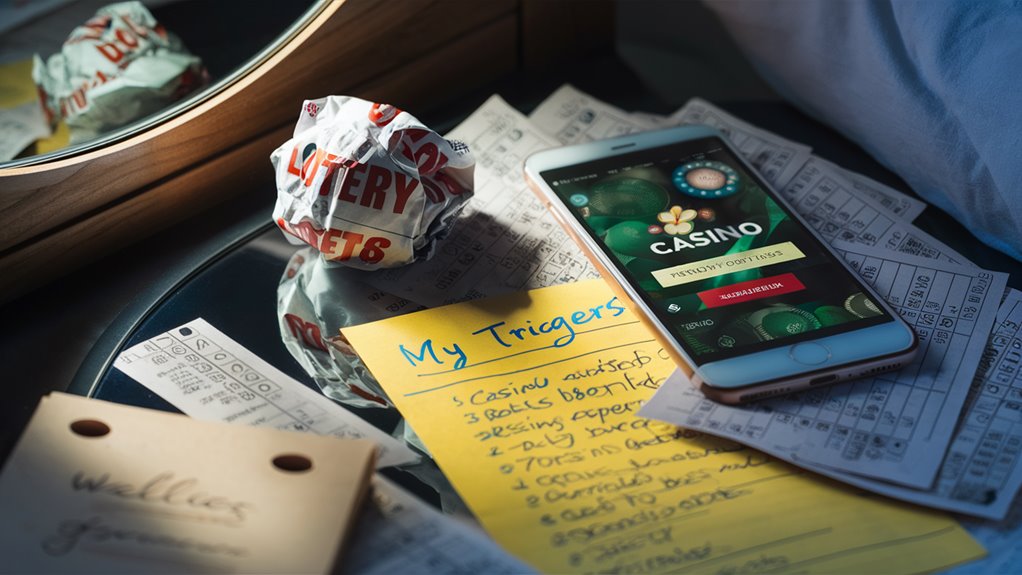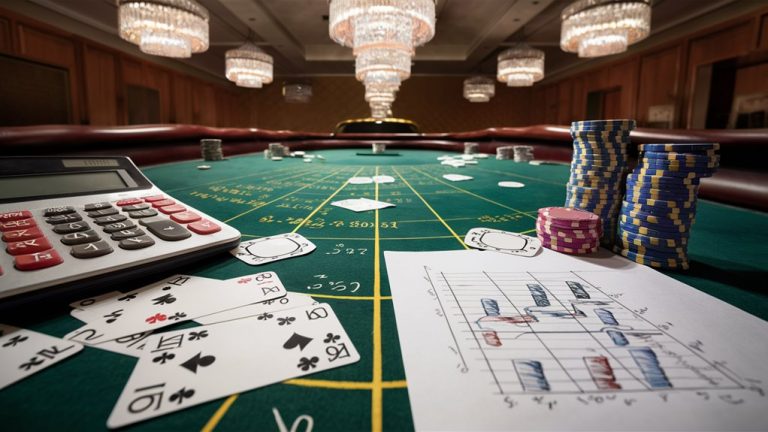
How to Prevent Gambling Addiction
Understanding Prevention Strategies
Implementing strict financial controls serves as the foundation for gambling addiction prevention. Set firm spending limits and adopt a cash-only system for any gambling activities. Create dedicated accounts with automatic transfer restrictions to maintain financial boundaries and prevent excessive spending.
Identifying Triggers and Risk Factors
Document personal triggers meticulously, including specific *emotional states*, *stress factors*, and *environmental conditions* that spark gambling urges. Understanding these behavioral patterns enables early intervention and helps develop effective coping mechanisms.
Building a Support System
Establish a robust support network through:
- Professional counseling services
- Gambling addiction support groups
- Trusted family members
- Accountability partners
Developing Alternative Activities
Replace gambling behaviors with healthy alternatives:
- Regular exercise routines
- Creative hobbies
- Community volunteering
- Social activities
- Mindfulness practices
Implementation of Technical Controls
Install comprehensive blocking software on all devices to restrict access to:
- Online gambling sites
- Sports betting platforms
- Casino applications
- Gambling-related content
Financial Monitoring Systems
Maintain detailed financial tracking through:
- Daily expense logs
- Gambling activity records
- Budget monitoring tools
- Account restrictions
- Transaction alerts
Recovery Maintenance Strategies
Create a sustainable prevention plan incorporating:
- Regular check-ins with support network
- Ongoing trigger assessment
- Progress tracking
- Stress management techniques
- Financial goal setting
Set Strict Financial Limits

Setting Strict Financial Limits for Responsible Gambling
Establishing Clear Gambling Boundaries
Money management serves as the cornerstone of responsible gambling practices.
Establishing firm, non-negotiable limits must precede any gambling activity.
Create specific daily and monthly gambling budgets that align with your disposable income, ensuring you only risk what you can genuinely afford to lose.
Implementing Financial Controls
Create a dedicated gambling bankroll separate from primary financial accounts to maintain clear boundaries.
When this designated amount depletes, cease all gambling activity immediately, regardless of winning or losing streaks.
Never utilize credit cards or borrowed funds for gambling purposes, as this practice often leads to severe financial complications.
Strategic Limit Setting
Monetary Boundaries
- Set concrete win limits to secure profits
- Establish loss limits to protect assets
- Implement deposit restrictions through gambling venues
- Utilize platform-specific betting limits
Financial Tracking System
Maintain a detailed spending log of all gambling transactions, reviewing it regularly for complete accountability.
Digital tracking tools and automated limits through gambling platforms provide additional safeguards against excessive spending.
When approaching or exceeding predetermined limits consistently, seek immediate professional financial guidance.
*[End of modified text]*
Know Your Triggers

Understanding Gambling Triggers: A Comprehensive Guide
Identifying Personal Triggers
Behavioral patterns and trigger recognition are crucial steps in maintaining control over gambling urges.
Maintaining a detailed trigger journal helps track specific situations, emotions, and events that precede gambling impulses.
Common catalysts include:
- Financial stress
- Emotional distress
- Professional pressure
- Relationship difficulties
- Social isolation
Environmental Risk Factors
External triggers exist throughout daily environments and routines.
Key environmental factors include:
- Casino proximity
- Sports broadcasting
- Gambling advertisements
- Online betting platforms
- Social media promotions
Emotional Vulnerability Analysis
Psychological triggers demand careful monitoring and management.
Track these critical elements:
- Time patterns
- Mood fluctuations
- Stress levels
- Life event impacts
- Social influences
Creating an Effective Prevention Strategy
Develop a structured trigger management plan:
- Document trigger encounters
- Establish avoidance protocols
- Implement coping mechanisms
- Create support networks
- Develop alternative activities
Regular assessment and adjustment of these strategies ensure long-term effectiveness in trigger management and gambling prevention.
Find Alternative Entertainment Activities

Alternative Entertainment Activities for Breaking Gambling Habits
Engaging Physical Activities
Physical exercise and sports participation offer powerful alternatives to gambling behaviors.
High-energy activities like team sports, fitness classes, and outdoor adventures naturally boost endorphins and create positive emotional responses.
Regular exercise routines provide both structure and natural excitement while promoting overall wellness.
Creative Pursuits and Skill Development
Artistic activities serve as effective gambling alternatives by engaging both mind and hands.
Creative hobbies such as painting, photography, or musical instruments foster skill development while providing meaningful entertainment.
These productive pastimes offer tangible results and personal growth opportunities, replacing the temporary thrills of gambling.
Social and Community Engagement
Group activities and community involvement create strong support networks while filling leisure time constructively.
Volunteer opportunities, sports teams, and local organizations provide structured social interactions and accountability.
Weekly commitments like book clubs or recreational leagues help maintain consistent, gambling-free routines.
Educational and Mental Stimulation
Learning-based activities challenge the mind similarly to gambling scenarios but with positive outcomes.
Skills development through online courses, language learning, or workshops provides intellectual engagement and measurable progress.
These mental challenges satisfy the desire for strategic thinking while building valuable knowledge.
Building a Sustainable Activity Plan
Personalized activity selection ensures long-term engagement and success in breaking gambling patterns.
Start with two or three core alternatives that match personal interests and scheduling needs.
Gradually expand activities based on effectiveness and enjoyment, creating a robust framework of healthy entertainment options.
Establish Support Network

Building a Strong Support Network for Gambling Recovery
Essential Support Network Components
Creating a comprehensive support system is fundamental for overcoming gambling addiction.
Identify trusted family members, close friends, and qualified mental health professionals who can provide consistent emotional support and accountability throughout recovery.
Select individuals who demonstrate understanding of addiction dynamics and maintain firm boundaries against enabling behaviors.
Professional and Peer Support Resources
Gambling addiction support groups serve as vital recovery pillars, offering both in-person and virtual connections.
Gamblers Anonymous meetings provide structured recovery programs and valuable peer support systems.
Partner with an addiction specialist therapist to develop personalized coping strategies and receive professional guidance tailored to your recovery needs.
Establishing Communication and Boundaries
Open communication about triggers and challenges strengthens recovery success.
Implement a system where support network members can monitor warning signs and intervene effectively.
Develop clear boundaries and emergency protocols for crisis management.
Maintain consistent check-ins with support team members to reinforce recovery progress and strengthen accountability measures.
Key Support Network Elements:
- Professional counseling support
- Peer recovery groups
- Family and friend accountability
- Crisis intervention protocols
- Regular progress monitoring
Your support network serves as a crucial foundation for sustained recovery, combining professional expertise with personal connections for comprehensive healing support.
Track Your Gambling Behavior

How to Track Your Gambling Behavior Effectively
Creating Your Gambling Activity Log
Self-monitoring gambling activities through systematic record-keeping is essential for recovery and responsible gaming.
Start by establishing a comprehensive tracking system that documents every gambling session with critical details:
- Date and time of gambling activities
- Location and type of venue
- Amount wagered and final outcomes
- Duration of gambling sessions
- Emotional triggers and mental state
Recording Emotional and Environmental Factors
Maintain detailed notes about your psychological and environmental circumstances surrounding each gambling event:
- Emotional state before and after gambling
- Social context and companions present
- Substance use involvement
- Financial impact on daily life
- Stress levels and life events
Digital Tools for Tracking
Implement digital tracking solutions to maintain consistent records:
- Mobile applications designed for gambling behavior monitoring
- Spreadsheet templates for detailed financial tracking
- Budget comparison tools to monitor spending limits
- Pattern recognition software for behavior analysis
- Recovery progress metrics documentation
Analyzing Patterns and Triggers
Review your documented data regularly to identify:
- High-risk situations that trigger gambling urges
- Financial threshold breaches
- Behavioral escalation patterns
- Emotional dependency indicators
- Recovery milestone progress
Share these insights with treatment professionals and support group members to enhance recovery strategies and maintain accountability.
Learn Warning Signs

Gambling Addiction Warning Signs: Early Detection Guide
Primary Warning Signs of Problem Gambling
Behavioral changes often emerge before a full-blown gambling addiction develops.
Understanding these warning signs enables early intervention and prevention of severe gambling-related problems.
Financial Warning Signs
- Spending excessive time and money beyond planned limits
- Chasing losses through increasingly larger bets
- Using essential funds intended for bills or basic necessities
- Borrowing money specifically for gambling activities
Psychological Indicators
- Persistent preoccupation with gambling experiences
- Emotional instability when attempting to reduce gambling
- Escape behavior using gambling to avoid problems
- Withdrawal symptoms including restlessness and irritability
Impact on Daily Life
Professional and Academic Effects
- Decreased work performance
- Missed deadlines or assignments
- Reduced concentration during important tasks
- Frequent absences from work or school
Social and Family Consequences
- Dishonesty about gambling activities
- Strained relationships with family and friends
- Neglected responsibilities at home
- Social isolation to hide gambling behavior
Documentation and Assessment
Tracking Warning Signs
- Record frequency of gambling activities
- Monitor spending patterns
- Document emotional states before and after gambling
- Note failed attempts to control gambling behavior
Next Steps
- Seek professional evaluation when signs appear
- Maintain detailed records of gambling patterns
- Implement spending controls immediately
- Consider self-exclusion from gambling venues
Practice Mindful Decision Making

Mindful Decision Making for Responsible Gambling
Setting Clear Boundaries and Limits
Time and money management form the cornerstone of responsible gambling behavior. Establish strict betting limits before any gambling session by documenting specific monetary boundaries and time restrictions.
Create a dedicated gambling budget in a separate account and utilize phone timers to track session duration. When reaching either predetermined limit, cease all gambling activity immediately.
Emotional Awareness and Self-Assessment
Mental state evaluation plays a crucial role in preventing problematic gambling patterns. Before engaging in any betting activity, conduct a thorough emotional check-in.
Recognize potential warning signs like using gambling to escape daily stressors or cope with negative emotions. Choose alternative stress-management techniques when identifying these risk factors.
The 24-Hour Cooling Period Strategy
Implement the proven 24-hour rule to maintain control over gambling impulses. This strategic waiting period allows for careful consideration of potential outcomes. During this time, evaluate the following factors:
- Financial impact on savings and budget
- Effect on personal and professional relationships
- Overall influence on mental wellbeing
- Long-term consequences of gambling decisions
Maintaining Control Through Mindful Choices
Responsible gambling practices require consistent awareness and strategic decision-making. Create a structured approach by:
- Recording all gambling activities
- Monitoring emotional triggers
- Establishing support systems
- Following predetermined exit strategies
- Regularly reviewing gambling patterns
This comprehensive framework helps maintain healthy boundaries while engaging in gambling activities.



